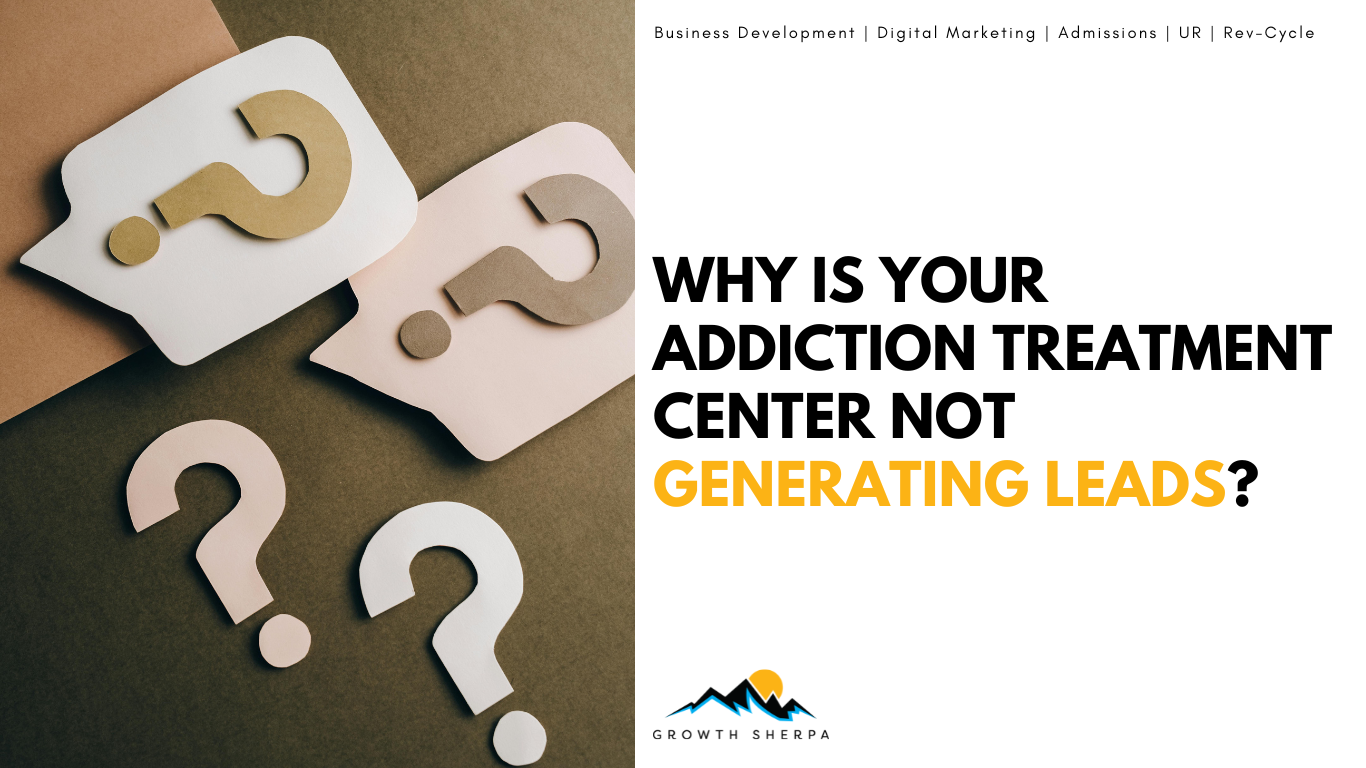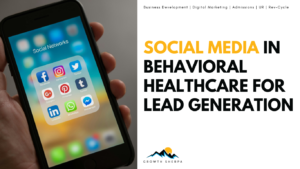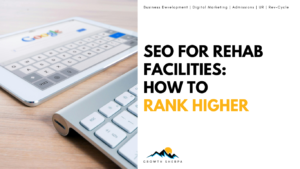The addiction treatment industry has become increasingly competitive as providers aim to reach patients in need of specialized care. With the digital age in full force, many facilities have turned to digital marketing to drive patient inquiries and admissions. However, some centers find themselves investing heavily in online strategies without seeing the leads they hoped for. Why is this happening? Often, the issue isn’t the decision to go digital, but rather the way digital strategies are being executed and managed. Let’s explore some of the underlying causes that could be preventing your addiction treatment center from reaping the full benefits of digital marketing.
Not Defining a Clear Target Audience
One of the primary reasons many addiction treatment providers fail to generate leads is a lack of clarity about their target audience. Behavioral health is diverse, with patients seeking treatment for a range of conditions including substance use disorders, mental health issues, and dual diagnoses. Without a clear understanding of the demographics, behaviors, and unique needs of your target patients, it’s challenging to create campaigns that resonate and attract the right people. A successful digital marketing strategy requires a deep dive into patient personas to ensure that all messaging, visuals, and outreach efforts align with what your prospective patients are looking for. If your facility hasn’t taken the time to build these personas, your campaigns may be falling flat.
Poor Content Strategy and Lack of Authenticity
Content also plays a crucial role in attracting leads. In addiction treatment marketing, your content has to balance empathy, expertise, and a call to action. If your content feels too impersonal, generic, or sales-focused, it may repel rather than attract prospective patients. Many addiction treatment centers fall into the trap of producing content that either over-promises or lacks an authentic voice. Patients and their families are looking for help, hope, and guidance from a provider who understands their struggles. Educational content that demonstrates expertise while addressing common fears and concerns tends to perform better, particularly when it emphasizes the real-life impact of your programs. Moreover, content needs to be consistently updated and relevant to maintain engagement. A stale blog section or lack of current news can signal to visitors that your facility may not be actively engaged or responsive, which can deter them from reaching out.
Ineffective Website Design
Another crucial factor that can hinder lead generation is poor website design. Your website is the digital front door of your facility, and its design, functionality, and user experience play significant roles in converting visitors into leads. Many addiction treatment websites are cluttered, hard to navigate, or don’t load quickly, leading to high bounce rates and missed opportunities. If potential patients can’t easily find information about your services, reach your contact page, or understand how your programs differ from others, they’re likely to leave without taking further action. A responsive, mobile-friendly, and visually appealing website with clear calls-to-action (CTAs) can significantly improve conversion rates. Equally important is the role of web design in search engine optimization (SEO); Google rewards websites that offer positive user experiences, so ensuring your website meets these standards can improve visibility and lead flow.
Lack of SEO Focus
In addition to web design, SEO itself is often a neglected or misunderstood component of digital marketing for addiction treatment. Many providers invest in pay-per-click (PPC) advertising, expecting instant results, but ignore the long-term benefits of organic search optimization. SEO helps your facility rank higher in search results when individuals are searching for terms related to addiction treatment. When SEO is not prioritized, your website may fail to rank well on Google, leading to fewer organic visitors and, consequently, fewer leads. Effective SEO requires keyword research specific to addiction treatment, optimization of on-page content, and regularly published relevant, valuable content. It’s not an overnight fix, but it establishes a strong foundation for sustained lead generation.
Ineffective Social Media Strategy
Social media marketing is another area where many treatment centers struggle to generate leads effectively. Social media platforms, when used strategically, can provide a steady stream of qualified leads. However, social media strategies need to be carefully managed to maintain professionalism, empathy, and compliance with industry regulations. Some providers find themselves either posting sporadically or sharing content that doesn’t resonate with their followers. Successful social media strategies often involve posting patient-centered content, sharing stories of hope and recovery, and engaging with followers in a way that builds trust and credibility. Engaging consistently and authentically with your audience is essential in establishing a sense of community, which can encourage prospective patients or families to reach out for more information.
Insufficient Lead Tracking and Analysis
Moreover, many addiction treatment centers overlook the importance of lead tracking and analysis in their digital marketing efforts. Without systems in place to capture and analyze data on website visitors, email subscribers, or ad performance, it becomes impossible to understand what’s working and what isn’t. CRM systems or marketing software are invaluable for tracking lead sources, assessing conversion rates, and understanding patient inquiries. If your facility isn’t analyzing this data, it’s easy to waste budget on ineffective campaigns while missing opportunities to enhance successful ones. Analyzing data regularly allows you to refine and optimize your digital marketing strategy based on real insights, ultimately improving your lead generation efforts.
Compliance and Ethical Considerations
Compliance and ethical considerations are also critical factors in addiction treatment marketing that, when overlooked, can have serious repercussions. Regulatory bodies like Google have strict policies for addiction treatment advertising, and failing to comply can lead to your ads being removed or your account being suspended. Additionally, misleading claims or aggressive marketing tactics may deter patients from reaching out. Being transparent, ethical, and respectful in your marketing approach is essential for building trust and credibility in a field where patients and families are already vulnerable.
Relying Too Much on One Marketing Channel
A final, and often overlooked, reason why addiction treatment centers may not be getting leads is an over-reliance on one or two marketing channels without a diversified strategy. Effective digital marketing should be multi-faceted, combining SEO, PPC, content marketing, social media, and email marketing to reach potential patients at various stages of their journey. Relying solely on PPC, for example, can lead to higher costs without long-term benefits, while focusing exclusively on social media might limit your reach to only certain demographics. Building an integrated, multi-channel marketing strategy that addresses the entire patient journey allows your facility to engage with patients at different touchpoints, maximizing the chances of generating qualified leads.
Addressing Gaps in Strategy, Execution, and Measurement
Ultimately, a lack of leads in digital marketing is often the result of gaps in strategy, execution, or measurement. Building a successful digital marketing strategy for addiction treatment requires a clear understanding of your audience, high-quality content, optimized web design, effective SEO, strategic social media, and data-driven analysis. It’s a challenging field with many unique requirements, but by addressing these key areas, your addiction treatment center can increase its visibility, credibility, and patient inquiries.




